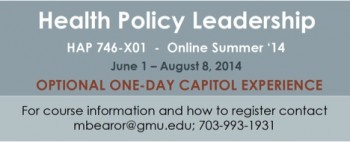Is Medicaid Sustainable, National Governors Association - Len M. Nichols
Testimony Sunday, February 27th, 2011Introduction:
Thank you, Governor Walker, Governor Kitzhaber, and other distinguished governors on this committee, for the opportunity to share some thoughts with you today and for the record about the sustainability of Medicaid. My name is Len M. Nichols. I am a health economist, a Professor of Health Policy in the College of Health and Human Services, and the Director of the Center for Health Policy Research and Ethics at George Mason University, in Fairfax, Virginia. The thoughts and opinions expressed herein are, of course, mine alone.[i]
Any specific answer given to your very good question, “Is Medicaid Sustainable?” depends upon one’s ideology, beliefs, the facts one accepts as true, and values. For me, on balance, the short answer to the question is “No, but it should be, and our collective job is to make it so.” Medicaid is a lifeline for our most vulnerable fellow Americans, whether young, disabled, or frail and elderly, and both its design and performance say a lot about our empathy and compassion as a people. Medicaid covers almost 60 million people at some point during each year, including one-third of all children, seven
out of ten nursing home residents, eight million low-income individuals with physical and mental disabilities, and nine million low-income Medicare beneficiaries.[ii] Two-thirds of all spending is for the twenty-five percent of beneficiaries who are either disabled or elderly or both. We will deserve to be judged harshly if we do not sustain the program where it is performing well[iii] and rectify the program’s vulnerabilities elsewhere so it can perform better for more people, beneficiaries and taxpayers alike, and become sustainable again. Therefore the task before you as the chief executive of your state is clear: to fix Medicaid, not to abolish or drastically curtail it.
[i] I am grateful to John Holahan, Jenny Kenney, Paul Van de Water, Edwin Park, Judy Solomon, and John Blacksten for very valuable comments and suggestions on an earlier draft, and to Beth Flashner, Ekom Etuk, Suchi Madan, and Melissa Sharpe for timely research assistance. All remaining errors are my sole responsibility.
[ii] Diane Rowland. “Overview of Medicaid and CHIP Payment and Access Commission,” presentation to the Medicaid and CHIP Payment and Access Commission (MACPAC), September 23, 2010. url
[iii] Jenny Kenney. Assessing Access to Dental Care for Children in Medicaid and CHIP,” presentation to the MACPAC, December 9, 2010. url.
“Is Medicaid Sustainable,” National Governors Association, February 27, 2011.
Click here to view the testimony.



